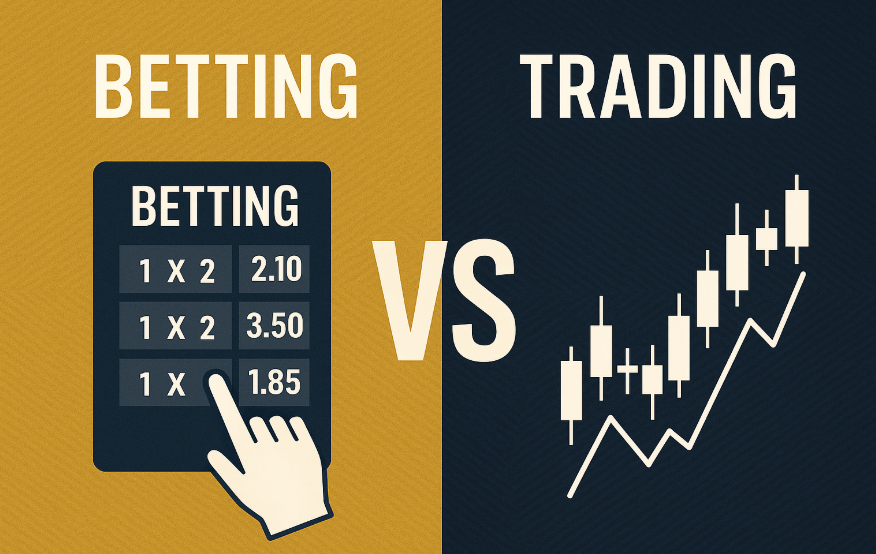In the modern age of digital finance and sports analytics, more and more people are starting to recognize surprising similarities between sports betting and financial trading. At first glance, they may seem worlds apart — one associated with leisure, adrenaline, and fandom, and the other with suits, stock charts, and investment strategies. But dig deeper, and you’ll find that both disciplines revolve around calculated risk, market knowledge, and emotional discipline.
In this article, we’ll break down the key similarities and differences between betting and trading and explore how strategies from one world can inform success in the other.
The Core Idea: Managing Risk and Probability
At their core, both betting and trading are about predicting future outcomes based on available information. In sports betting, you’re wagering on a specific result (like a football team winning), while in trading, you’re buying or selling an asset expecting a price change in your favor. In both cases, the goal is simple: make informed decisions that lead to long-term profit.
Where many go wrong is treating them like games of luck rather than probability-driven decisions. Whether it’s a last-minute goal or a sudden stock dip, volatility is a shared enemy — or opportunity.

Key Similarities Between Betting and Trading
Here are a few aspects that unite sports bettors and market traders:
📌 Common Traits:
- Risk Management: Both require you to set clear limits. Never risk more than you can afford to lose.
- Bankroll/Capital Allocation: A trader protects their capital; a bettor manages their bankroll.
- Data-Driven Decisions: Analyzing team stats or financial charts — both depend on informed choices.
- Emotional Control: Greed and fear can destroy performance in both activities.
- Value Hunting: In betting, it’s about finding mispriced odds; in trading, it’s about undervalued assets.
The Differences: Entertainment vs. Investment
Despite their overlap, the goals and psychological frameworks are different.
Betting
- Often emotionally driven
- Short-term results (90 minutes, one match)
- Entertainment and excitement factor
- Usually lower capital requirements
- Higher variance, especially in accumulator bets
Trading
- Long-term strategy focus (though day-trading exists)
- Professional mindset with investment return goals
- Influenced by economic and political factors
- Often regulated and licensed environments
- Lower emotional spikes per trade (ideally)
Lessons Bettors Can Learn from Traders
Many professional bettors apply principles from the world of finance to improve their long-term performance.
- Diversify bets the way traders diversify portfolios
- Track and analyze past performance like a stock analyst
- Use tools like expected value (EV) and Kelly Criterion to optimize bet sizing
- Focus on ROI rather than one-time wins
- Avoid emotional decisions after a loss (“tilt” in poker, “revenge betting” in sports)
Lessons Traders Can Learn from Bettors
On the flip side, traders can also gain insights from seasoned punters:
- React to live information in real time — much like live bettors do
- Learn to spot patterns of irrational behavior in “the market crowd”
- Understand the psychological appeal of risk-taking and factor it into behavioral analysis
Comparative Snapshot
| Factor | Betting | Trading |
|---|---|---|
| Goal | Short-term profit or fun | Long-term financial gain |
| Tools Used | Odds, stats, EV models | Charts, indicators, fundamentals |
| Influencing Factors | Team news, weather, form | News, earnings, geopolitics |
| Risk Management | Stake limits, bet sizing | Stop-loss orders, position size |
| Regulation | Loosely regulated | Heavily regulated (in most areas) |
Betting and trading might exist in different cultural spaces, but their shared mechanics make them closer than most people think. In both, knowledge is power. Without discipline, strategy, and continuous learning, losses are almost guaranteed. But for those who respect the math, understand the markets (whether sports or stocks), and keep emotions in check — the potential is very real.
So whether you’re placing a bet on a Sunday match or watching the NASDAQ tick upward, remember: it’s not about luck. It’s about the edge.

